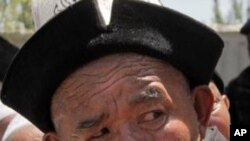Violence in southern regions of the Kyrgyz Republic has resulted in the deaths of more than 190 persons and almost 2000 wounded. There are an estimated 300,000 – mostly ethnic Uzbek women and children - displaced people inside the Kyrgyz Republic and 100,000 more who have crossed into Uzbekistan.
While in Bishkek at the June 19 press conference, Assistant Secretary Robert Blake stressed the urgent need for the interim government to bring the security situation under rapid control in order to stop the violence and to allow the delivery of humanitarian assistance to internally displaced persons and ethnic Uzbek areas in the south.
The United States government has committed over 32 million dollars to programs for humanitarian relief, reconstruction, and community stabilization, and expects to announce additional efforts in the near future for southern regions of the Kyrgyz Republic and for the refugees who have arrived in Uzbekistan from the Kyrgyz Republic. U.S. government funding has been directed to meet immediate humanitarian needs and also to addressing the roots of the conflict through community development and conflict mitigation programs in southern regions of the Kyrgyz Republic.
Protests in the capital Bishkek on April 6th and 7th led to the ouster of President Kurmanbek Bakiyev and resulted in the establishment of the Provisional Government. On June 10th and 11th, ethnic tension in southern regions of the Kyrgyz Republic resulted in violence and an exodus of ethnic Uzbeks from Osh, Jalal-Abad and towns and villages in the region.
Many are now at risk from a lack of food, water, shelter, and medical services. Thousands have fled to Uzbekistan and thousands of others are seeking shelter in the southern regions of the Kyrgyz Republic after their villages and homes were destroyed. Concerns over the security situation in southern Kyrgyzstan are impeding the work of humanitarian organizations, such as the World Food Program.
The United States is working with the Provisional Government of the Kyrgyz Republic, the Government of Uzbekistan, the United Nations, the Organization for Security and Cooperation in Europe, and the International Committee of the Red Cross to meet the humanitarian needs of those caught up in the violence. The people currently in the Kyrgyz Republic and those that have fled to Uzbekistan need security. They need an end to ethnic violence and hatred. And they urgently need democracy and the rule of law.
Crisis In Kyrgyzstan

Some 300,000 people are displaced inside the Kyrgyz Republic, mostly ethnic Uzbek women and children. 100,000 more who have crossed into Uzbekistan.



